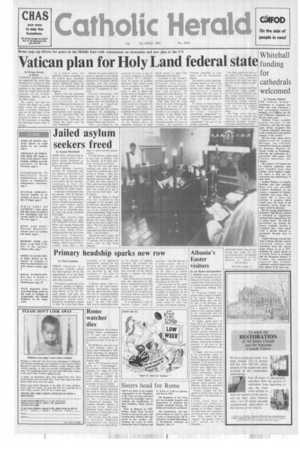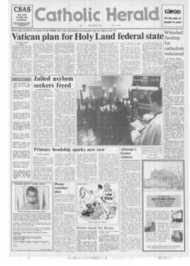Page 1, 5th April 1991
Page 1

Report an error
Noticed an error on this page?If you've noticed an error in this article please click here to report it.
Tags
Share
Related articles
Pope Plans Middle East Visit
Patriarch's Remarks On Holy Land Anger Israeli Leaders
Vatican
Vatican Left Out Of Holy Sites By Israel
Israel And Rome Close Ties
Rome steps up efforts for peace in the Middle East with concessions on Jerusalem and new plea to the UN
Vatican plan for Holy Land federal stat
by Viviane Hewitt in Rome VATICAN diplomatic sources sugested this week that the Hoy See's efforts to find a solution to the Palestinian question in the wake of the Gulf var would focus on the creat.on of an IsraeliPalestinian federal state in the Holy Land.
The reports said that the Vatictn had drawn up a plan which rejects the options of either a separate Palestinian state on the left bank of the River Jordan, currently occupied by Israel in violation of UN resolutions, or resettling the Palestinian people closer to Jordan.
In a federal state, the preferred option according to the Vatican plan, Jerusalem would remain the capital with a special additional status by virtue of its sacredness for the three major monotheistic religions.
Reports from the secretariat of state also suggested this week that following Vatican clarifications on its acknowledgement of the state of Israel — if not formal recognition — Palestinian representatives were starting to press for equivalent Holy See diplomatic status for a Palestinian state. Until now, the Vatican has always used the term "homeland". Pressure for such a course of action is thought to be coming from the Palestinian-born Latin Patriarch of Jerusalem, Michel Sabbah, who has already referred publicly to his people's need for "recognition of their state".
Vatican diplomacy will advance its proposal for a federal Holy Land state by making what were described by the church as "significant moves in Israel's regard".
Before the Gulf war, Vatican diplomacy was demanding a peace treaty on the Middle East question as a condition for an exchange of ambassadors between Rome and Tel Aviv.
Now, according to the
secretariat of state, a sign of "concrete willingness to initiate the process for a solution" could be enough to establish diplomatic links denied Israel since its foundation in 1948.
Another change in Vatican policy is said to regard the special status of Jerusalem. The Vatican would now accept a special treaty which would safeguard the Holy City but which would also recognise the "technical" sovereignty of Israel over Jerusalem, hitherto a stumbling block for Rome.
Moreover, Vatican diplomats have shifted the focus from an international peace conference on the Middle East, an unpopular proposal in Israel which refuses to allow full Palestinian participation.
According to the Vatican's recently appointed Secretary for Relations with States, Archbishop Jean-Louis Tauran, the Holy See would be satisfied that "one initiative" be undertaken in this direction. "It might be one round of negotiations or many", he said.
Pope John Paul has made clear in the weeks following the ending of the Gulf war his personal determination to work towards a just • solution of the problems of the Middle East which he outlined during the conflict as the fate of the Palestinian people, the future of Lebanon, the treatment of Christian minorities in Arab lands, and the Iraq-Kuwait dispute.
The pontiff is also reportedly working towards a visit to the Holy Land, although his advisors have made clear that the Vatican's troubled relationship with the state of Israel would have to be resolved before such a trip could be made.
In a letter to United Nations Secretary General, Javier Perez de Cuellar, Pope John Paul 11 has urged "energ'etic international commitment" to resolve the Middle East question without "humiliation" or "punishment" for any of the peoples concerned. The Pope signed the letter in the name of the bishops and patriarchs from countries involved in the Gulf war who had met in the Vatican in early March.
The letter, in which John Paul expressed his "great esteem" for the Secretary General, was also being interpreted as a diplomatic gesture following semi-official Vatican criticism of the United Nations during the Gulf war for its alleged subordination to the United States.
The Pope wrote that the Vatican post-war summit had resolved to "continue and elaborate dialogue between Christians, Moslems and Jews".
blog comments powered by Disqus











